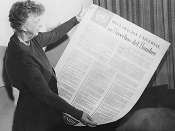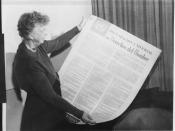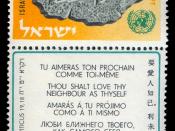Two early American documents, the Constitution and the Declaration of Independence have, over the past 200 years, influenced a great number of democratic ideas and institutions. The Declaration of the Rights of Man and the Citizen and the Universal Declaration of Human Rights share many obvious similarities to both the Declaration of Independence and the Constitution.
The Declaration of the Rights of Man and the Citizen was written by the Marquis de Lafayette, approved by the National Assembly of France in 1789, and gave meaning to the revolutionary cry "Liberty, Equality, and Fraternity." The Universal Declaration of Human Rights was written on December 10, 1948 by the General Assembly of the United Nations. Its purpose was to make known the "standards" for living set by the members of the United Nations.
Although there are many similarities between the two American documents and the two later documents, only four are the most impacting and relevant.
According to the Universal Declaration of Human Rights, Article 17.1, "Everyone has the right to own property alone as well as in association with others." This is taken from the Declaration of Independence, "...that among these are life, liberty, and the pursuit of happiness." At the time of the Declaration of Independence, the pursuit of happiness referred to the right to own land, or the right to be/become someone. Accordingly, this important issue is addressed in both documents; that every man has the privilege to own land. Another point is brought up in both of the documents, and that our country consistently prides itself on is the freedom of religion. Article 18 of the Universal Declaration of Human Rights states that, "Everyone has the right to freedom of thought, conscience and religion; this right includes freedom to change religion or belief, and freedom,


